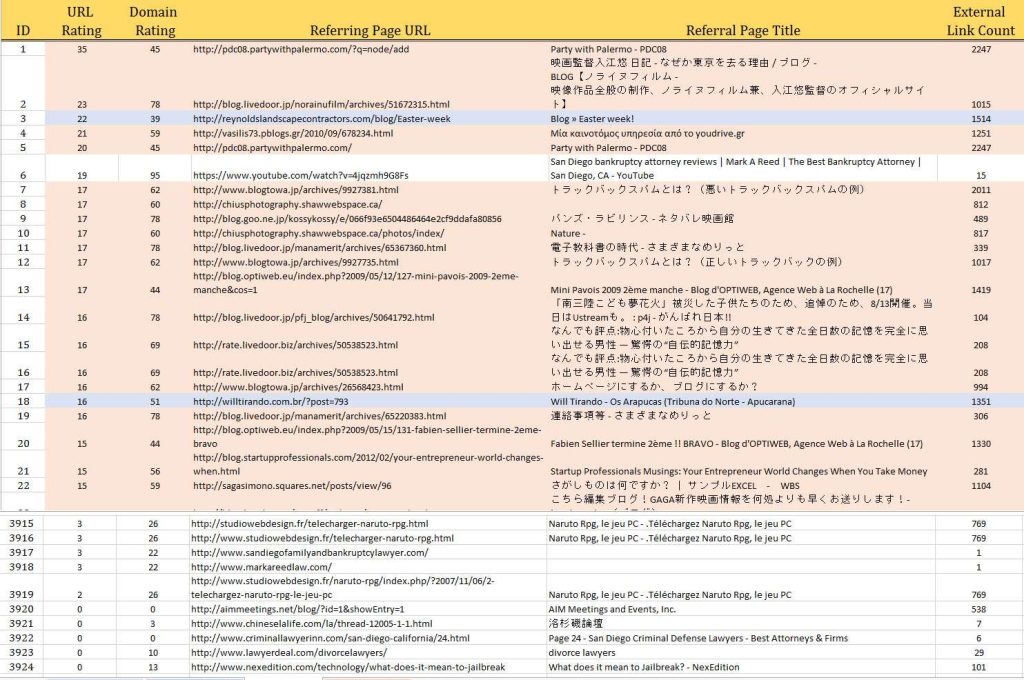Last week, I met an attorney who was paying a freelancer for SEO, but wasn’t seeing any results. Business was slow, his SEO was not doing anything to help, so he approached me to conduct an audit. When I eyeballed his site, I could tell that the optimization work was subpar, but it wasn’t until I completed the audit that I uncovered the true extent of the damage this “garage SEO” had done. The attorney was — unknowingly — paying someone for black hat SEO, which is essentially spam and can be heavily penalized.
This attorney learned the lesson the hard way: it’s better to pay a little bit more to hire an agency you can trust than it is to risk your money on the cheaper option.
What is “Garage SEO?”
I conducted a three-part audit for the client, looking at the site’s on-page and off-page SEO, as well as a preliminary backlink analysis. First things first, I thought the site has a lot of positive things going for it: it’s nice looking (no need for an immediate re-design), it’s mobile responsive, and it has good content. That’s where the positivity ends.
The first warning signs were the meta titles and meta descriptions. Let me explain what these are:

When your SEO says that he or she is optimizing your website’s titles and descriptions, he’s referring to the information that can directly influence how your website shows up on Google (and other search engines). They don’t directly affect your ranking, but they do serve as a pitch — they persuade the searcher to click on the link and go to your website. A bad title or description and the searcher isn’t going to click-through to your site, meaning you lose the potential customer.
This client’s title tags were spammy and I can’t say anything about the meta descriptions…because there were none! So, whoever he was paying to SEO his site had failed “SEO 101.”
At this point, my outrage is relatively tame, because those are easy fixes — although, still, the client was paying this guy to do, apparently, nothing. But, my concern grew from there and rather quickly.
I won’t bore you with the details, so I’ll just list out the major issues I came across:
- The big call-to-actions on the home page were not linked. Then why have them? It’s not nice to tease the visitor, especially since you want them to buy your services.
- There were spammy links that the guy doing the SEO work had tried to hide all the way at the bottom of the footer.
- The URL structure did not reflect the organization of the content. Think about it this way: yourdomain.com/cosmetic/veneers, rather than www.yourdomain.com/veneers, gives Google a better idea of the logic behind the organization of the website and it helps them prioritize pages for indexing.
- It was difficult to find the exact page one might be looking for.
- The text was not appealing to read because it was not segmented in a way that makes it easy to scan.
These things are easy(ish) to fix, right? So what’s the big deal? Well, again, the client was spending money on a guy who wasn’t doing anything for him.
Actually, he did some things. He bought a lot of spammy links. There were about 4,000 links, so I looked at the first 100. This is what it looks like:

That’s a lot of red and you can see that the links don’t get any better after that. I spent all day yesterday going through every single link (all 3,924 of them…and rising). Most of them were fake blog posts where some service leaves a comment packed with about 20 links to different websites — obviously spam. I’d say that less than 5% of the attorney’s backlink profile is legitimate.
You have to be very careful! A backlink profile like the one in the image above can earn you a manual penalty. Even if you don’t get a manual penalty, Google released a dedicated update to their algorithm that seeks these spam links out and eliminates any positive effect they might have had. So again, best case scenario, the client paid his SEO to do absolutely nothing positive for him — if anything, he hurt the search engine traffic the client was getting.
What started out as “cheap SEO” turned into “horribly expensive SEO.” (A) All the money he already invested earned a zero or negative return. (B) Now he needs to pay to clean the site’s SEO up and he has to pay for all the months it’ll take to recoup lost ground.
Trust is Vital — It’s Worth Paying For It
While getting the same, or more, for less is always good, oftentimes those offers are too good to be true. Good SEO costs more because people know it’s good SEO, so they’re willing to compete and pay for it.
How do you know who can provide you with good SEO? Most agencies will have portfolios of their work — see what they’ve accomplished. Ask your consultant for examples of similar work that has been successful and ask for referrals. There’s no reason not to; if they don’t want to give you any of this information, don’t work with them.
However, some of the responsibility of making sure you’re getting what you bought is on you. Sometimes the value you’re getting back from your SEO investment is obvious, because the phone is ringing, you’re getting emails from your website’s contact form, and there’s people walking through your front door. Sometimes, the return is not so clear. What can you do in these cases?
It’s true that you don’t have access to all of the tools we use, but there are plenty of free tools — that your agency should be setting your site up on — that you can check or receive reports from. These include Search Console (formerly known as Google Webmaster Tools) and Google Analytics, which provide you with information on your performance on search and on the traffic you’re getting. This is the bread and butter of SEO (the whole point is to increase traffic to your website). You don’t know how to read these reports? Ask your consultant to walk you through them!
Even if you don’t have access to a specific tool, it’s still within your rights as the client to ask for something to substantiate the work the agency has been doing. For example, Local SEO can be hard to quantify at first, because results aren’t immediate. Still, Now Media Group is ready to provide you with a cited report of the work we’ve done and we are more than ready to go over our work with you on the phone.
The reason I bring all of this up is because I asked the client why he hadn’t been monitoring his site’s SEO. He told me he doesn’t have the tools. I understand, and I realize that it’s easier for someone with an SEO background to know what good or bad SEO is, but that’s why you should make sure that your consultant is willing to walk you through the evidence. And you don’t have to constantly monitor your agency; you just want to establish trust, so do it until you feel comfortable that the person or agency you hired is doing the work you’re paying for.
Join the Conversation
What experiences have you had? Do you have any techniques that have found you success in vetting agencies? Join the conversation in the comments below.
